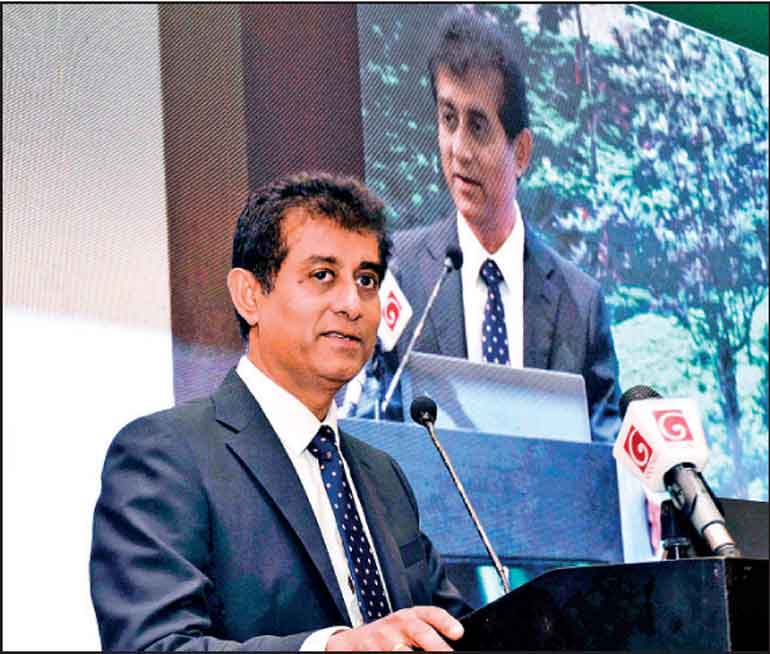Friday Feb 27, 2026
Friday Feb 27, 2026
Friday, 5 September 2025 00:00 - - {{hitsCtrl.values.hits}}

Senior Economic Adviser to President Duminda Hulangamuwa
- Pic by Upul Abayasekara
Senior Economic Adviser to the President Duminda Hulangamuwa last week warned that Sri Lanka’s plantation industry faces an urgent need for structural reforms if it is to remain sustainable in the face of declining output and a shrinking labour force.
Delivering the keynote address at the 171st Annual General Meeting of the Planters’ Association of Ceylon last Friday, Chief Guest Hulangamuwa stressed that the plantation sector remains a “backbone of the economy,” supporting over 1.5 million Sri Lankans and generating around $ 1 billion annually from tea, rubber and coconut exports.
Despite tea production growing from 179 million kilograms in 1992 to 262 million kilograms today, he opined the pace of increase has been modest, while rubber output has dropped by a third and coconut has shown only marginal gains. Land under tea and rubber cultivation has also contracted, and yields have remained largely stagnant.
“The question is not whether planters are committed, they clearly are; but whether we are satisfied with where we are? We need to consider carefully what the way forward is, given these overall declines,” he said.
Noting that one of the sector’s most pressing challenges is labour, he said employment in estates has fallen from 300,000 in the 1990s to around 100,000 today, with workers drifting towards better-paid urban jobs. “If we can’t pay the wages that workers are demanding, they will leave. That’s normal. The challenge is to pay competitive wages while ensuring companies remain profitable,” he noted.
He urged the industry to embrace mechanisation and technology as the only viable path to sustaining productivity in the face of labour scarcity.
Hulangamuwa also drew attention to land use, pointing out that the Government is moving to monetise underperforming State-owned plantations in Matale, Kandy and Nawalapitiya by leasing them to more capable operators. “Demand will be strongest where land can be diversified beyond traditional crops,” he added.
Placing the plantation sector within the broader economic framework, Hulangamuwa highlighted Sri Lanka’s improving macroeconomic fundamentals under the IMF program. Inflation, revenues and reserves were on track, with foreign reserves standing at $ 6.2 billion and projected to reach $ 7 billion by year-end. The steady rupee, even amid a surge in vehicle imports, indicated resilience, he said, adding that lower interest rates were expected as revenues improve and borrowing eases.
On infrastructure, he confirmed that the JICA-backed airport expansion will begin next year, while agreements for Phase I of the Central Expressway with Chinese financing have been finalised. “We expect the first phase to commence in September or October, with the final phase now under evaluation. While these works could be funded from Government balances, we prefer external financing to preserve fiscal space. These projects will also stimulate demand in the construction sector.
In terms of foreign direct investment (FDI), Hulangamuwa said the immediate priority was boosting industry and tourism. While Sri Lanka cannot yet match destinations like Maldives or Thailand, he argued the country’s price competitiveness could drive growth, provided carrying capacity and heritage assets such as Sigiriya are protected.
In the longer term, ports and logistics remain the “engine of growth,” with extensions to Colombo Port and new container terminals planned.
“I am confident that, if stability holds, these reforms will go through and we will attract global capital. When the broader economy moves, the plantation industry will benefit; no sector can grow in isolation. I share these points not as a sales pitch but as a straight update, because everywhere I go people ask what is happening, what the Government is doing, and where we are headed,” he said.
He assured to work with the PA to address obstacles with SVAT among them. “Every industry has issues; there is no perfect playing field and there will be ups and downs. What matters is that we resolve policy frictions sincerely and keep moving. My message to the industry is simple—if macroeconomic stability holds and reforms proceed, plantations will benefit. Prepare now on productivity, mechanisation, wage competitiveness and diversification, to seize the opportunities of lower interest rates and new investment frameworks. We will work to reduce policy frictions, but there will never be a perfect playing field. What matters is that structural issues are addressed with sincerity and pragmatism,” he stressed.